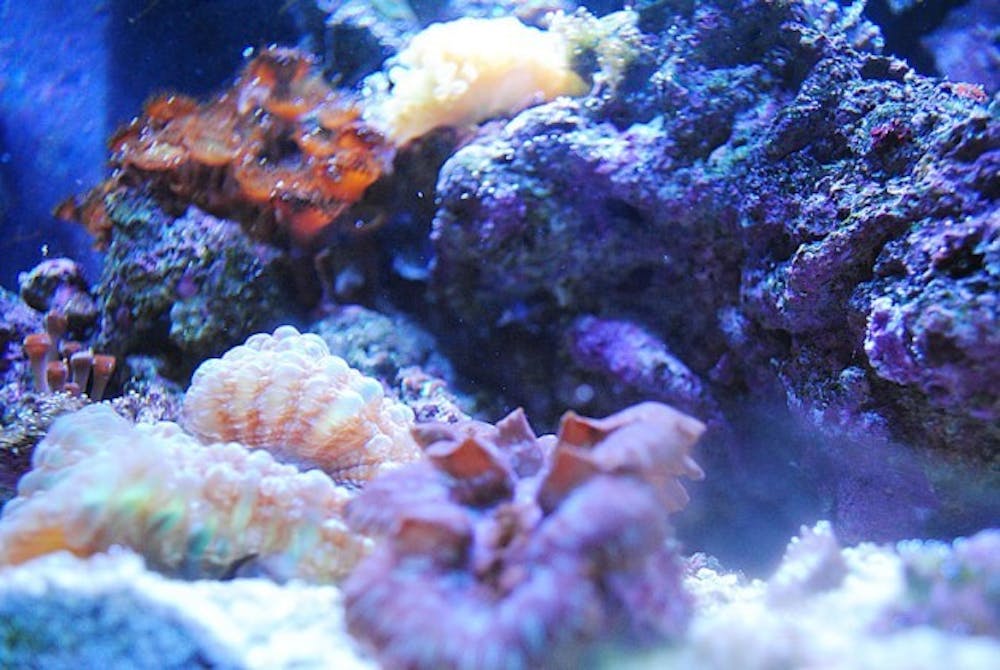According to the results of a recent UB experiment, the future of the ocean's coral reefs is uncertain, and the beauty of the ocean floor is not the only thing in danger.
Mary Alice Coffroth, professor of geological sciences, has conducted a study focused on the question of whether coral reefs would be able to adapt to rising sea temperatures caused by global warming and live on in the future.
Coffroth and her collaborators are looking for possible natural solutions to coral bleaching, the process by which coral reefs lose all of the algae they carry. Coral bleaching is a common consequence of increased water temperature.
Because coral reefs and the algae they carry are traditionally thought to be dependent on each other for survival, Coffroth has investigated possible ways that coral reefs could naturally recover from bleaching.
Two such recovery options were explored.
The first possibility considered that corals would be able to replace the algae lost to the bleaching process through the reproduction of algal symbionts remaining in their tissues. The second considered whether corals could acquire new, different algal species from the environment after bleaching.
The experiment consisted of collecting various types of coral reef samples from the Florida Keys National Marine Sanctuary. After the researchers had bleached the samples by increasing the water temperature, they tested them to see if they took up new forms of algae.
The five-week observation period after bleaching showed that most of the coral reefs did not acquire new algae. In the few cases where that did happen, the algae were gone in two weeks, leading the researchers to hypothesize that newly acquired algal species are incapable of being maintained by coral.
This obstacle to the survival of coral reefs could have drastic environmental consequences. Apart from their contribution to underwater beauty, corals serve as an important food source for sea animals and form protection for the shoreline as barriers against natural disasters.
"They also contain a lot of organisms that we haven't explored that could be very important in medical research," Coffroth said. "There have been a lot of anti-cancer drugs that have been produced from marine organisms."
According to Coffroth, the effects of coral extinction would be felt by the ecosystems where coral exists and the economies of nations around the globe.
"A lot of these small nations [in the Caribbean] solely depend on the reefs for a food source and for income," Coffroth said. "They provide protection from surges in coastal areas such as Florida and Hawaii and are economically important as a fishery's resource and a tourism destination."
The next step in the scientific process is for Coffroth's experiment to be repeated and retested by others in the scientific community.
In the meantime, UB researchers have teamed up with the Aquarium of Niagara in hopes of receiving a Pepsi Refresh grant to create a living coral reef exhibit that will educate children of all ages.
Dan Arcara, supervisor of exhibits at the Aquarium of Niagara, expressed his hope that the exhibit would spark increased awareness about the importance of the coral reefs.
"Coral reefs are comparable to rain forests," Arcara said. "They are just as important to the environment as rain forests; they are their underwater counterpart."
Arcara's vision for the new exhibit includes an interactive 800-gallon tank that would feature soft and hard coral and a variety of indigenous fish.
For the researchers to obtain the grant, the proposal for the new exhibit must receive enough votes to put it in the top 10 of all the projects being considered.
"The most important thing is to get people to vote every single day to help get us to the top ten so we are guaranteed a grant," Arcara said. "It's very important [to have this exhibit], because the reefs are in serious danger of disappearing in the next 50 years."
To help the effort to get votes into the petition, send a text to 73774 with 102344 in the body of the text. Also, anyone can vote online by going to www.refresheverything.com and searching for Niagara.
Additional reporting by Amanda Jonas, Asst. News Editor





